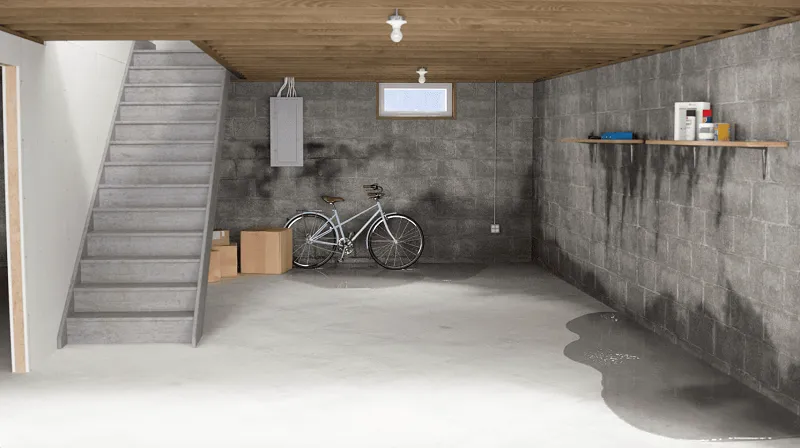How Does Basement Waterproofing Work? A Comprehensive Guide

Basements are essential to many homes, providing valuable storage space, room for utilities, or even additional living areas. However, one of homeowners' most significant challenges is preventing water intrusion and moisture-related problems in basements. This is where basement waterproofing comes in. This comprehensive guide will explain how basement waterproofing works, covering everything from the types of waterproofing methods to the benefits of a properly waterproofed basement.
Understanding Basement Moisture Problems
Before diving into basement waterproofing methods, it’s crucial to understand why basements are susceptible to water intrusion and moisture problems. There are several factors contributing to basement moisture issues, including:
- Hydrostatic pressure: Water in the soil surrounding your basement exerts pressure on the basement walls, leading to cracks and water seepage.
- Poor drainage: Inadequate drainage systems can cause water to accumulate around your basement, resulting in leaks and moisture problems.
- Capillary action: Water can be drawn into your basement walls through tiny pores, causing dampness and potential damage.
- High humidity: Basements are often poorly ventilated, leading to high humidity levels that can cause condensation and mold growth.
Types of Basement Waterproofing Methods
Three main categories of basement waterproofing methods exist: interior, exterior, and drainage systems. Each type has advantages and disadvantages, so choosing the most suitable option for your specific needs is essential.
Interior Waterproofing
Interior waterproofing focuses on addressing moisture problems from inside your basement. The primary objective is to prevent moisture from entering your living space and manage any water that has already penetrated your basement.
- Waterproof coatings and sealants: These are applied to your basement walls and floor to create a barrier that prevents moisture from seeping through. Waterproof coatings and sealants are often made of cement, acrylic, or epoxy-based materials.
- Vapor barriers: Vapor barriers are sheets of plastic or foil material installed on the walls and floor of your basement to prevent moisture from entering your living space.
- Dehumidifiers: Installing a dehumidifier in your basement helps to reduce humidity levels, minimizing the risk of condensation and mold growth.
Exterior Waterproofing
Exterior waterproofing involves addressing moisture problems from outside your basement. This method is used during the home building process. We do not encourage exterior waterproofing solutions after the home is built.
- Exterior waterproof coatings: These are applied to the exterior walls of your basement to create a barrier that prevents water from penetrating your foundation.
- Exterior drainage systems: Exterior drainage systems, such as French drains, are installed around your basement’s perimeter to collect and redirect water away from your foundation.
- Waterproof membranes: Waterproof membranes are sheets of rubber or plastic material installed on your basement's exterior walls to prevent water intrusion.
Drainage Systems
Drainage systems use interior and exterior waterproofing to manage water accumulation around your basement.
- Interior drainage systems: These systems are installed beneath your basement floor to collect and redirect water that has penetrated your foundation.
- Sump pumps: Sump pumps are used to remove water collected by interior and exterior drainage systems, preventing it from causing damage to your basement.
The Benefits of a Properly Waterproofed Basement
Waterproofing your basement provides numerous benefits that can significantly enhance the overall comfort and value of your home:
- Protects your home’s structural integrity: Waterproofing prevents water damage to your basement walls and foundation, ensuring your home's long-term stability.
- Prevents mold and mildew growth: Keeping your basement dry reduces the risk of mold and mildew growth, which can cause health problems and negatively impact your home’s air quality.
- Increases energy efficiency: A dry basement is more energy-efficient, as dampness can make it more challenging to heat or cool your home.
- Boosts property value: A waterproof basement is a valuable asset to potential buyers, increasing your home’s resale value.
- Expands usable living space: A dry, well-maintained basement can be transformed into a functional living area, providing additional space for bedrooms, home offices, or entertainment rooms.
Choosing the Right Basement Waterproofing Solution
Selecting the appropriate basement waterproofing solution depends on your specific needs, budget, and the extent of your moisture problems. It’s essential to consult with a professional waterproofing contractor who can thoroughly assess your basement and recommend the best course of action.
Here are some factors to consider when choosing a basement waterproofing solution:
- Type of foundation: Different foundations, such as poured concrete, concrete blocks, or stone, may require different waterproofing methods.
- The severity of moisture problems: The extent of your basement’s moisture issues will determine the most suitable waterproofing methods. For instance, minor dampness may only require interior waterproofing, while more severe water intrusion may necessitate exterior waterproofing and drainage systems.
- Budget constraints: The cost of waterproofing solutions varies significantly, so it’s essential to choose a method that fits within your budget while still providing adequate protection against water intrusion.
- Plans for your basement: If you intend to finish it and convert it into a functional living space, you may need to invest in more comprehensive waterproofing methods to ensure long-lasting protection.
Professional Basement Waterproofing Services
While some homeowners may be tempted to tackle basement waterproofing as a DIY project, hiring professional waterproofing contractors is highly recommended. These professionals have the expertise, tools, and materials to waterproof your basement properly, ensuring long-lasting protection against water intrusion.
Here are some tips for selecting a reliable basement waterproofing contractor:
- Research local contractors: Gather a list of reputable waterproofing contractors in your area by asking for recommendations from friends, family, or online review platforms.
- Verify licenses and insurance: Ensure that the contractor you choose is licensed and insured. This demonstrates their commitment to industry standards and protecting your property.
- Request quotes and references: Obtain multiple quotes from different contractors and ask for references to compare their services and pricing.
- Check for warranties: A reputable waterproofing contractor should offer a warranty on their work, providing peace of mind and promptly addressing any issues.
Conclusion
Basement waterproofing is crucial to maintaining your home's structural integrity and overall value. By understanding the various waterproofing methods and working with a professional contractor, you can effectively protect your basement from water intrusion, mold growth, and other moisture-related problems. Investing in basement waterproofing not only safeguards your home but also enhances its energy efficiency and provides the potential for additional living space.
We offer financing plans, accept major credit cards and personal checks.
See what customers have to say about working with USS.
Our customer reviews speak for themselves.




